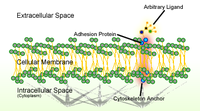
Photo from wikipedia
Background/Aim: Activated leukocyte cell adhesion molecule (ALCAM/CD166), a member of the immunoglobulin superfamily, has been shown to regulate cell adhesion through both homotypic and heterotypic interactions. In cancer, it might… Click to show full abstract
Background/Aim: Activated leukocyte cell adhesion molecule (ALCAM/CD166), a member of the immunoglobulin superfamily, has been shown to regulate cell adhesion through both homotypic and heterotypic interactions. In cancer, it might be involved in disease progression and chemotherapy drug resistance. The present study explored the clinical and prognostic significance of ALCAM in gastric cancer and its impact on patient’s responses to neoadjuvant chemotherapies and cancer cells’ response to chemodrugs in vitro. Materials and Methods: Two independent cohorts were included to evaluate the link between ALCAM and the clinical outcomes and pathological factors of the patients. The gastric cancer cell lines HGC27 and AGS were used to generate ALCAM knockdown cell models. The cytotoxicity of chemotherapy drugs was examined using ALCAM knockdown cell models. Results: Patients with gastric cancer who had high levels of ALCAM transcripts showed a significantly shorter overall survival in both cohorts (p=0.043 and 0.006, respectively). Patients who resisted to neoadjuvant chemotherapy had marginally higher levels of ALCAM than those responded (p=0.056). Patients with low levels of ALCAM expression and resisted to neoadjuvant chemotherapy had the worst clinical outcome with a significantly shorter overall survival (p=0.004) and disease-free survival (p=0.006), whereas such results did not appear in high ALCAM expression patients. ALCAM knockdown cells were more sensitive to Cisplatin, Oxaliplatin and 5-Fluorouracil compared with their respective control cells. Conclusion: ALCAM acts as a negative prognostic indicator in patients with gastric cancer and high levels of ALCAM expression result in increased chemotherapy drug resistance.
Journal Title: AntiCancer Research
Year Published: 2023
Link to full text (if available)
Share on Social Media: Sign Up to like & get
recommendations!